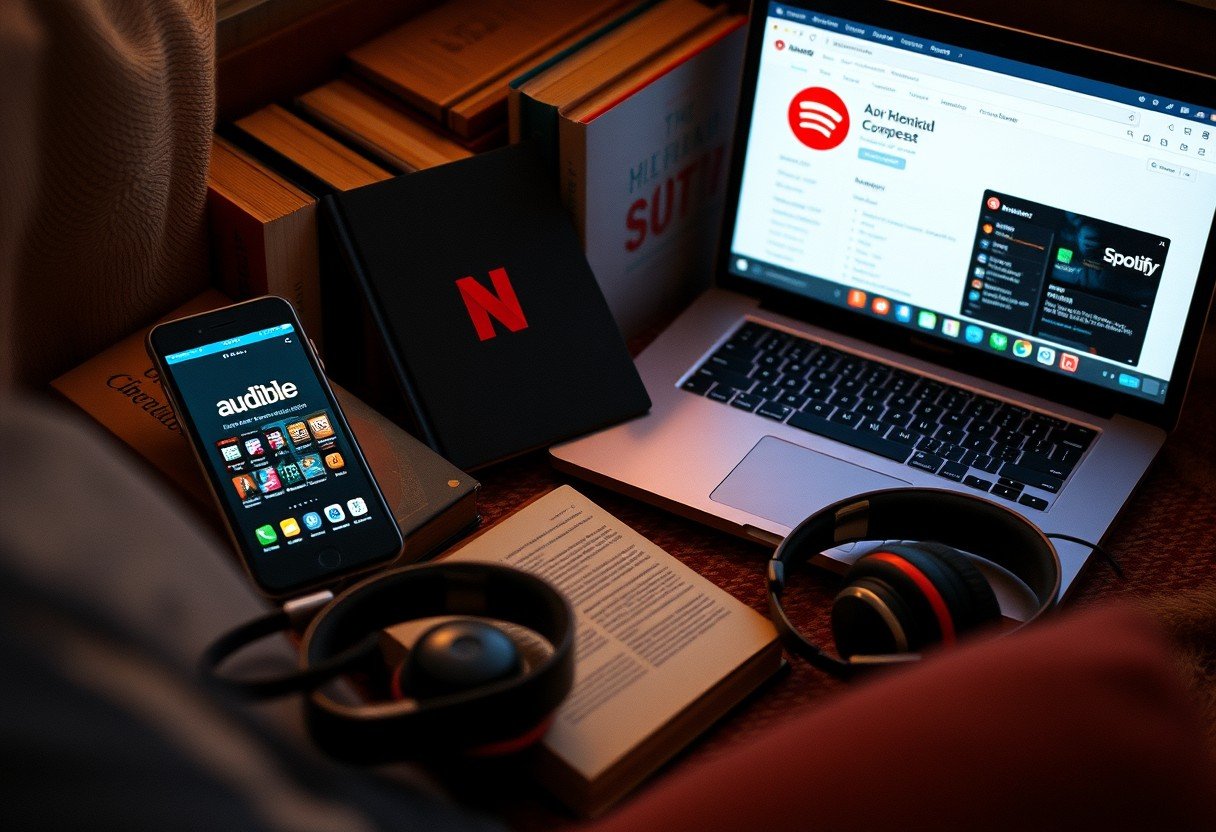Have you ever listened to an Audible book and felt completely transported by the narrator’s voice? The person behind the microphone plays a huge role in your listening journey. Audible narrators range from professional voice actors and famous celebrities to the authors themselves, each chosen to bring a unique and engaging performance to the story. Understanding who they are and how they are selected can deepen your appreciation for the art of audiobooks.
The Crucial Role of a Narrator in Audiobooks
The narrator is the bridge between the written word and the listener’s imagination. They do more than just read a book aloud; they perform it, setting the tone, pace, and atmosphere of the entire story.
A skilled narrator helps you connect more deeply with the characters and the plot. Their ability to convey emotion, maintain clarity, and distinguish between different character voices is what transforms a simple reading into a vivid, captivating experience. A great performance can make a good story unforgettable, while a poor one can make it difficult to finish.
Ultimately, the narrator’s contribution is invaluable. They ensure you remain immersed and engaged, making the story resonate with you long after you’ve pressed pause.
Who are the Voices Behind Audible Books?
Audible features a diverse range of talent to cater to different genres and listener preferences. The choice of narrator is often a deliberate decision to match the voice with the book’s content and style.
From seasoned professionals who specialize in audiobooks to authors who want to tell their own story, the variety is vast. This ensures that whether you’re listening to a thrilling novel or an insightful non-fiction book, the voice you hear is perfectly suited for the material.
Here are the common types of narrators you will encounter on Audible:
| Type of Narrator | Description |
| Professional Voice Actors | Skilled individuals trained in performance, often specialized in bringing stories to life. |
| Authors | Writers who narrate their own work, providing unique insights and authentic emotion. |
| Celebrities | Famous personalities who lend their voices, attracting listeners with their star power. |
| Multi-narrator Productions | Multiple narrators lend their voices to various characters, enhancing the audiobook experience. |
How is an Audible Narrator Chosen?
The process of selecting the perfect narrator is an intricate part of audiobook production. It begins with a close collaboration between the author and the publisher, where they discuss the key elements of the book, including its themes, characters, and overall mood.
The author’s input is vital in helping the publisher identify potential narrators who can effectively capture the work’s essence. This partnership ensures the final voice aligns with the original vision for the story.
The Audition and Casting Process
Once a list of potential narrators is created, the audition process begins. Narrators are asked to perform selected excerpts from the book to showcase their vocal abilities and interpretation of the text. This is where the story starts to come alive through different voices.
The author and publisher often listen to these auditions to find the perfect match. They look for a narrator whose tone and style resonate with the narrative, elevating it in a way that will captivate listeners. This careful selection aims to find a voice that truly embodies the characters and engages the audience from the first chapter to the last.
The Skills That Make a Great Narrator
Not just anyone can become a professional audiobook narrator. It requires a specific set of skills honed through training and practice. These skills go far beyond simply having a pleasant voice.
Effective narrators must master the technical and artistic sides of storytelling. This includes everything from controlling their breath during long recording sessions to interpreting the emotional core of a scene. Their training allows them to deliver a seamless and engaging performance for hours on end.
Key skills include:
- Vocal Technique: This covers breath control, resonance, and the ability to adjust tone and volume to convey different emotions and prevent vocal strain.
- Pacing: Knowing when to speed up during an action sequence or slow down for a dramatic moment is crucial for keeping the listener engaged.
- Character Differentiation: A great narrator can create distinct voices for multiple characters, making dialogue easy to follow and the characters more memorable.
- Acting and Interpretation: The best narrators are also skilled actors who understand character motivations and can bring the text to life with an immersive performance.
How Narration Shapes Your Listening Experience
The narrator’s performance has a profound impact on how you experience a story. A talented voice artist can enhance the original text, adding layers of nuance and emotion that you might not catch when reading a physical book.
Your engagement is directly influenced by the narrator’s tone and pacing. This auditory experience helps build a vivid mental picture of the story, making it a richer and more immersive journey. The right voice can make you feel like you are right there in the middle of the action.
A narrator’s ability to convey joy, sadness, or tension allows you to experience these emotions viscerally. This creates a powerful emotional connection to the characters and their experiences, making the story more relatable and impactful.
The Future of Audiobook Narration
The world of audiobook narration is constantly evolving with technology and changing audience tastes. As artificial intelligence becomes more sophisticated, the possibilities for new types of narration are expanding.
Innovations in voice synthesis are making AI-generated voices sound more and more human. While many listeners will always prefer a human performance, this technology could open doors for narrating a wider variety of content in the future.
We are also seeing new trends in narration styles. There is a growing demand for diverse voice actors who bring unique cultural perspectives to texts. Additionally, co-narration, where multiple actors voice different characters, is becoming more popular, creating a dynamic, play-like experience for the listener.
Frequently Asked Questions
Who narrates Audible books?
Audible books are narrated by a variety of people, including professional voice actors, the authors themselves, and well-known celebrities. The narrator is often chosen to match the genre and style of the book to provide the best listening experience.
Can authors narrate their own books on Audible?
Yes, many authors choose to narrate their own books. This is especially common for memoirs and non-fiction, as it adds a layer of authenticity and a personal touch to the storytelling.
Are there different types of narrators on Audible?
Absolutely. Audible features solo narrators who read the entire book, multi-cast productions with different actors for each character, and even dramatic adaptations with sound effects and music to create a more immersive experience.
How does Audible choose its narrators?
Narrators are selected based on their vocal quality, acting skills, and experience. Publishers and authors often review audition samples to find a voice that is a perfect fit for the tone and characters of the book.
Can listeners provide feedback on narrators?
Yes, listeners are encouraged to leave reviews on Audible, which can include feedback on the narrator’s performance. This helps other listeners make informed choices and provides valuable information for future productions.








Leave a Comment